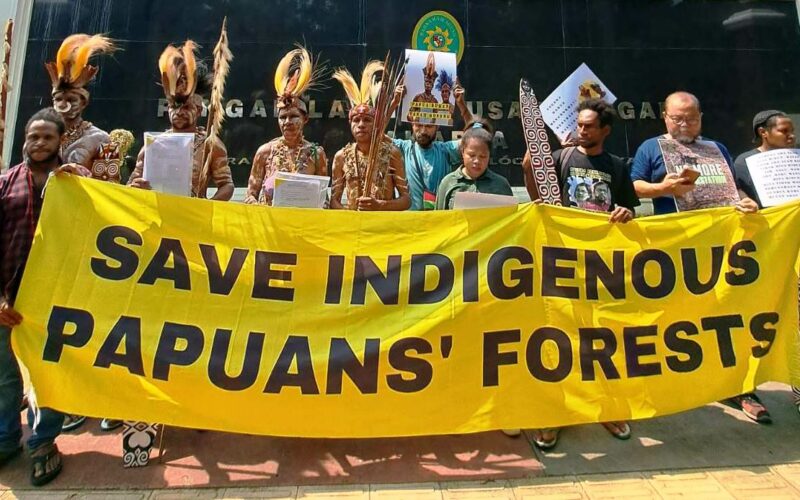Indigenous activists from the Indonesian province of West Papua are taking legal action to prevent four palm oil companies from clearing vast areas of forest for plantations. On Monday, representatives of the Awyu and Moi communities held traditional ceremonies, including prayers and dances, outside the Supreme Court in Jakarta as it reviewed their appeal to revoke permits issued to the palm oil companies.
“We have taken the long, difficult, and expensive path from Tanah Papua [Papua homeland] to end up here in Indonesia’s capital Jakarta, asking the Supreme Court to restore our rights, and the land that was snatched from us when these palm oil companies were issued permits over it,” said Hendrikus “Franky” Woro, an Awyu Indigenous man. Woro has filed an environmental and land rights lawsuit in Jayapura, the Papuan capital, challenging a Malaysian-owned palm oil company’s plan to clear tens of thousands of hectares of untouched West Papuan forest, including traditional Indigenous land.
Greenpeace has raised concerns about the environmental impact of these plans, stating that clearing the 26,326 hectares of primary forest would release approximately 23 million tonnes of CO2, equivalent to 5% of Indonesia’s projected annual carbon emissions by 2030.
The Awyu community is also involved in appeals against two other palm oil companies whose permits were canceled by the minister of environment and forestry. These revocations could protect 65,415 hectares of pristine rainforest, an area six times the size of Paris, according to Greenpeace.
For the Awyu and Moi communities, the Supreme Court represents their last chance to defend their customary forests and ancestral heritage. Rikarda Maa, an Awyu Indigenous woman, emphasized the significance of their struggle, saying, “We have been tormented for years by the threat of our traditional forests being replaced by palm oil plantations. We want to raise our children with the help of nature, and the food and materials we harvest from the forest. Palm oil will destroy our forests, we reject it.”
The Moi community is similarly fighting to protect thousands of hectares of their customary forest from being converted into palm oil plantations. Despite the revocation of the company’s permits amid community opposition, lower courts ruled in favor of the planter.
Tigor Hutapea, a member of the legal team from Pusaka Bentala Rakyat, urged the judicial panel to consider the broader implications of the case, stating, “The judicial panel needs to prioritize aspects of the case that relate to environmental and climate justice, the impact of which will not only be felt by the Awyu and Moi but the entirety of the Indonesian people.”
According to Global Forest Watch, more than 74 million hectares of Indonesian rainforest have been logged, burned, or degraded since 1950 for the development of palm oil, paper, and rubber plantations, nickel mining, and other commodities. Indonesia is the world’s largest producer of palm oil, with Malaysia being the second-largest. The country is also a major exporter of coal, rubber, and tin.








